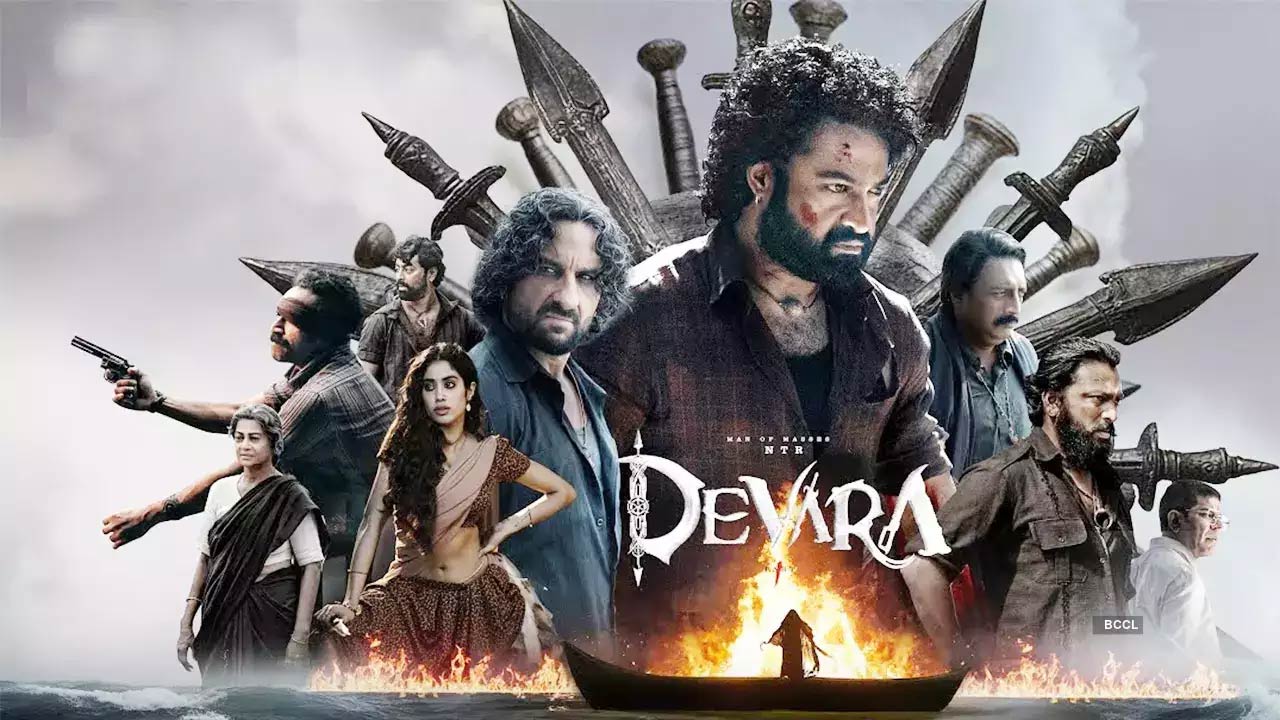
Devara Review: Jr NTR, Janhvi Kapoor, and Saif Ali Khan’s cinematic endeavor presents a paradoxical experience. While certain elements glimmer with promise, their scarcity may merely tantalize aficionados of grandiose action and melodramatic narratives.
New Delhi:
Devara: Part 1 (Hindi) is a veritable whirlwind of relentless action and breathtaking visuals, yet it conspicuously lacks authentic emotional resonance. This film caters primarily to viewers who, bereft of a genuinely original narrative, prefer to revel in its monumental scale, the star power on display, and an arsenal of swords, scythes, and sleek scimitars.
Set against the backdrop of the final two decades of the twentieth century, the film attempts to compensate for its narrative deficiencies through technical flair. However, apart from sporadic scenes that resonate, it fails to ascend to the lofty expectations typically associated with a production of such magnitude.
Aside from its clunky and often melodramatic dialogue, the film’s most significant flaw lies in its lackluster, clichéd dichotomy of good versus evil, centered around four villages perched atop a mountain that gazes down upon a shark-infested expanse. The region bears a sordid history of violence, with its inhabitants venerating their weaponry as divine.
The villagers dwell within a vast, feverish landscape, where heinous acts of violence unfold until the eponymous hero—who leads a formidable band of fearless men—experiences a profound transformation, resolving to eradicate evil from both the ocean and the surrounding settlements.
This lawless terrain is inhabited by the descendants of valiant warriors who once bested British oppressors. Now, they find themselves ensnared as sea marauders under the thumb of arms dealers, who surreptitiously transport their illicit cargo aboard sailing vessels.
A protracted sequence depicts a daring raid by the Coast Guards on one such vessel. As the ship undergoes inspection, the villagers, having infiltrated, orchestrate a breathtaking escape before being apprehended. This scene serves to introduce both the protagonist and antagonist of Devara: Part 1 as intrepid combatants.
Jr NTR adopts a dual role, portraying both a fearsome, indomitable warrior and a timid son reluctant to engage in violence. Saif Ali Khan assumes the role of the antagonist, displaying only as much finesse as the screenplay crafted by director Koratala Siva allows, which significantly limits the actor’s range.
Devara: Part 1 commences in 1996 with a conclave of senior Bombay police officers, alarmed by intelligence regarding a mafia don poised to disrupt the forthcoming Cricket World Cup. A senior lawman is dispatched southward, accompanied by a team, to apprehend the crime lord, who has remained elusive in the public eye for months.
Upon arrival, the police stumble upon the legend of Devara, recounted by Singappa (Prakash Raj), an elderly witness to the heroic deeds of a man who valiantly challenged his own people to safeguard both them and the sea from the pernicious influence of self-serving villains.
Devara (NTR Jr) ultimately vanishes into the depths of the ocean, vowing to prevent Bhaira (Saif Ali Khan) and his ilk from perpetuating their illegal pursuits that jeopardize innocent lives. The looming threat of vengeance deters the ship raiders momentarily. However, Bhaira marshals a fierce cadre of young men to execute his commands as he patiently awaits the opportunity to retaliate.
Devara: Part 1 is thoroughly dominated by men of malice. The female characters—most notably Devara’s mother (Zarina Wahab) and wife Jogula (Shruti Marathe)—are relegated to the periphery, portrayed as gentle souls caught in the narrative’s crossfire. They wield minimal influence over the unfolding events that affect their family and village. Women, whether they be mothers, lovers, concubines, or soothsayers, receive a uniform treatment of disregard.
By the time Janhvi Kapoor enters as the daughter of a former associate of Devara, the film has ventured well into its second half. She assumes the role of a glorified extra, a striking young woman fixated on the timid son of Devara, Vara (NTR Jr), but asserts she will only marry him should he display his father’s strength and valor.
Janhvi participates in a couple of unintentionally humorous romantic interludes and an entire musical number that allows her (and the protagonist) a series of wardrobe changes and picturesque backdrops. However, she subsequently disappears from the narrative without a trace after fulfilling her limited role.
As Devara: Part 1 offers no discernible hints regarding the potential trajectory of Part 2, one is left uncertain about the Bollywood star’s role in the subsequent installment of her inaugural Telugu-language project.
What distinguishes Devara: Part 1 is the editing finesse exhibited by A. Sreekar Prasad, whose deft cuts render the film more coherent as a narrative—despite its simplistic premise—than many recent Southern blockbusters such as KGF, Pushpa, Bahubali, and RRR.
The film’s streamlined progression alleviates the burden of its three-hour runtime, ensuring that the experience does not become cumbersome for the audience. While the film’s aspirations may align with those of KGF or Pushpa, it exhibits a notably smoother trajectory, even as it accommodates dual portrayals of NTR Jr and a Saif Ali Khan seeking to redefine the very essence of villainy.
Anirudh Ravichander’s background score ebbs and flows in tandem with the film’s action, frequently skirting the line of overwhelming crescendos. The musical numbers likewise drift in and out without leaving a lasting impact.
However, nothing in Devara: Part 1 proves as disheartening as the visual effects. While not quite as abysmal as the infamous Adipurush, the underwater sequences, tempestuous ocean scenes, explosive encounters, and superhuman feats lack the sophistication one would expect, landing somewhere between ordinary and outright tacky. This facet necessitates substantial enhancement in the upcoming installment.
In summary, Devara: Part 1 is undeniably a mixed bag. The few elements that succeed may tantalize fans of grandiose action and melodrama, yet the shortcomings fail to meet expectations. These shortcomings risk undermining the prospects of the ambitious two-part narrative.
